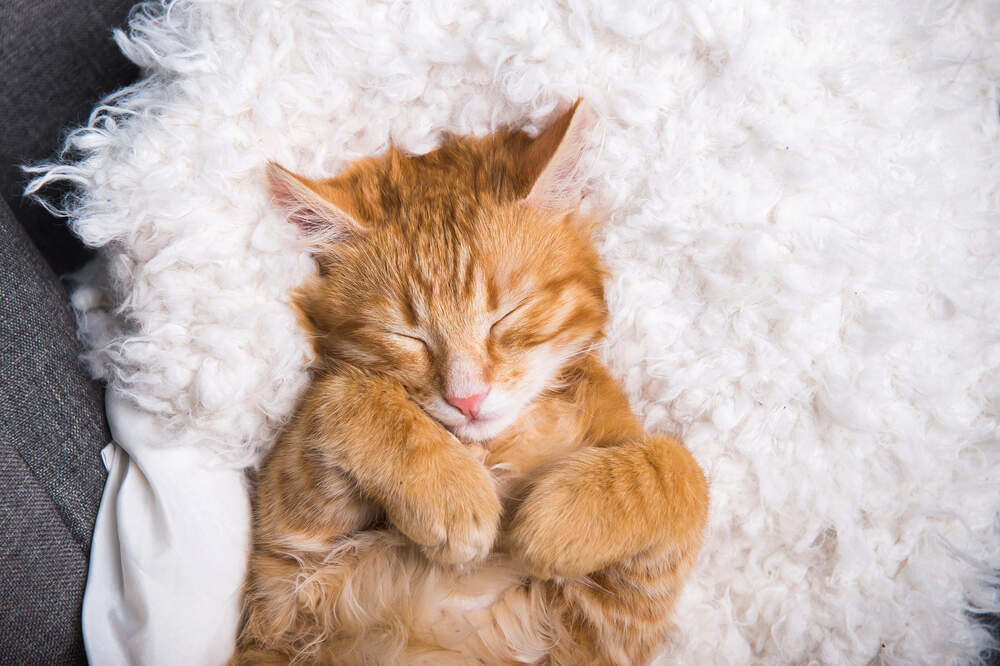How Much Do Cats Sleep?
Cats absolutely love to sleep. So, if you notice your cat napping all the time, it's typically nothing to worry about. Kitties need a lot more sleep every day than their human counterparts. So, just how much do cats sleep? The number of hours they sleep during the day while you're awake depends on their age, health and how active they've been at night while you're asleep.
Cats Sleep Much More Every Day than Humans
Sure, you're used to an eight-hour-a-night sleep schedule. But cats sleep a lot more than that. Adult cats range from sleeping as little as 12 hours a day1 to as much as 20 hours.2 Senior cats tend to sleep more than young adult cats. Newborn kittens sleep close to 24 hours a day, while older kittens in the 8-to-12-week range tend to sleep closer to 20 hours a day.3 So, don't be surprised if you notice your cat sleeping most of the day.
Cats are "crepuscular" in nature, which means they're most active at dawn and dusk, unlike humans, who are most active during the day. As a result, they're more likely to yawn a lot and act sleepy while you're feeling active. Some cats, however, can be trained to sleep when you do at night. If you want to encourage this, play with your cat just before bedtime to expend her energy. Then give her a nice meal after you've played. This will put her in the perfect state of mind to snuggle down and go to sleep.
Your Cat's Hunting Instincts Lead to Sleeping More
So why do cats sleep so much? Part of it is their natural hunting instinct. Wild cats use a lot of energy when they're chasing prey, so they sleep a lot to help conserve energy and have it ready at a moment's notice. Your kitty still has those natural instincts.
Cats are naturally adapted for hotter environments that require them to conserve their energy and body temperature by sleeping more. They also tend to sleep deeply for just about five minutes at a time, then doze in a lighter sleep state for about 15- to 30-minute increments.4 Your cat may even sleep in a position that allows him to wake up and get moving faster if an emergency arises. That's why your cat springs to action so fast, even when it looks like he's asleep. He really is subconsciously listening for unusual noises that need his attention right away.
Cats Sometimes Sleep More When They're Sick
Cats sometimes sleep more and become lethargic in general when they're sick. Once you get a better idea of how much sleep your cat normally needs, you'll be able to tell if she seems to be sleeping too much. If she's feeling ill, she might also act listless, have less energy and not play around the house like she normally does. Sick cats might eat or drink less, which can leave them feeling more tired. If you think your cat is sleeping too much, set up an appointment with your veterinarian right away.
Consider How Active Your Cat Was While You Were Sleeping
If you notice your cat sleeps all day, it might be because he's not really sleeping through the night. Some cats will curl up with you at night, then get up after you've fallen asleep and have adventures throughout the house.
If your cat is active at night while you're sleeping, then he has to make up for that time by sleeping during the day while you're awake. It will look like he's sleeping more than he really is. If you think this might be the case, try setting up a camera in your home to record while you're sleeping. Check it when you wake up to see if your cat was active at night and is catching up on his sleep during the day.
Comfort Zone Products Can Help with Stress
If your cat is stressed, he may display stress symptoms, like peeing and spraying in the house, scratching destructively or meowing a lot. And Comfort Zone products can help. These products are designed to help address your kitty's "e-meow-tional" health, which is just as important as his physical health. Comfort Zone calming products mimic your cat's natural pheromones, communicating to him that an environment is safe and he can relax.
The Comfort Zone Cat Calming Diffuser with Opticalm Diffuser can be plugged into any room where your cat spends a lot of time to help promote relaxation. If you have more than one cat, consider using the Comfort Zone Multi-Cat Diffuser with Opticalm Diffuser.
If your kitty's on the go a lot, the Comfort Zone Calming Pheromone Collar can keep those calming signals with him wherever he goes. If he's showing other signs of stress, like spraying or destructively scratching, try spraying the Comfort Zone Spray & Scratch Control Spray on the problem areas, like the carpet or furniture.
Set up a few cat trees so your kitty has elevated spaces to escape to, play with him more often and shut the shades at night so he doesn't see stray cats wandering nearby might also help reduce stress.
Cats naturally sleep far more hours on a daily basis than humans do. If you think your cat's sleeping too much, he might secretly be having a lot of adventures at night while you're fast asleep. If your cat is stressed, try using Comfort Zone products to help him feel more relaxed and calm.
1. Kotteman, Katie. "Cat Sleeping Habits." Sleep.org, 26 March 2021, https://www.sleep.org/cats-sleep-habits/.
2. OVRS Staff. "An Age-Old Mystery: Why Do Cats Sleep So Much?" Oakland Veterinary Services, 6 September 2017, https://www.ovrs.com/blog/cats-sleep/.
3. VetStreet. "Your Kitten: What To Expect at 8 to 12 Weeks." VetStreet.com, 14 May 2013, http://www.vetstreet.com/cats/your-kitten-what-to-expect-at-8-to-12-weeks.
4. PetMD Editorial. "Why Do Cats Sleep So Much?" PetMD.com, 7 July 2016, https://www.petmd.com/cat/behavior/evr_ct_why_do_cats_sleep_so_much.

